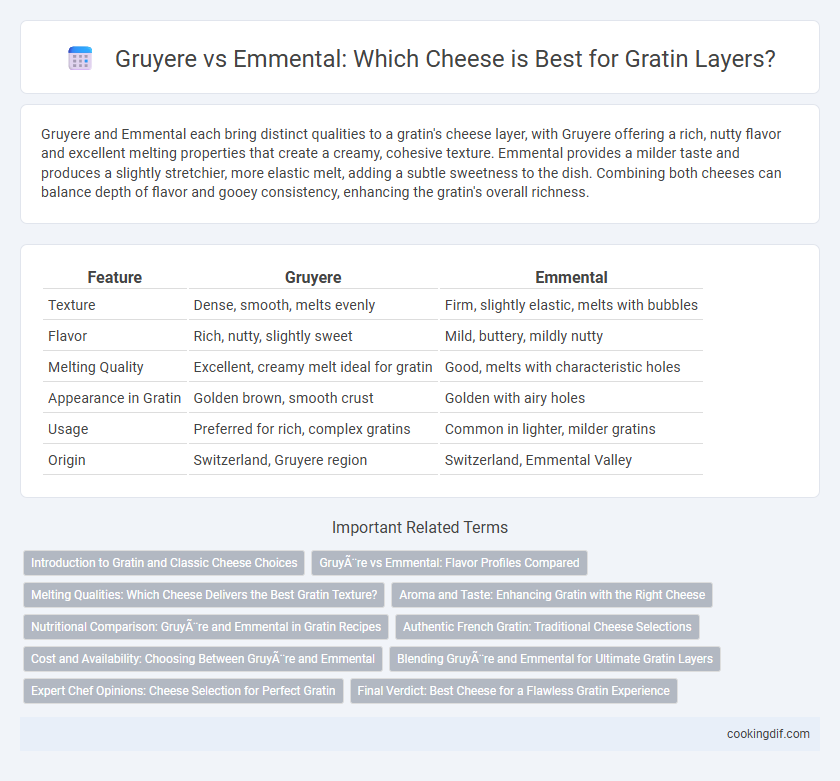Gruyere and Emmental each bring distinct qualities to a gratin's cheese layer, with Gruyere offering a rich, nutty flavor and excellent melting properties that create a creamy, cohesive texture. Emmental provides a milder taste and produces a slightly stretchier, more elastic melt, adding a subtle sweetness to the dish. Combining both cheeses can balance depth of flavor and gooey consistency, enhancing the gratin's overall richness.
Table of Comparison
| Feature | Gruyere | Emmental |
|---|---|---|
| Texture | Dense, smooth, melts evenly | Firm, slightly elastic, melts with bubbles |
| Flavor | Rich, nutty, slightly sweet | Mild, buttery, mildly nutty |
| Melting Quality | Excellent, creamy melt ideal for gratin | Good, melts with characteristic holes |
| Appearance in Gratin | Golden brown, smooth crust | Golden with airy holes |
| Usage | Preferred for rich, complex gratins | Common in lighter, milder gratins |
| Origin | Switzerland, Gruyere region | Switzerland, Emmental Valley |
Introduction to Gratin and Classic Cheese Choices
Gratin is a classic French dish characterized by a golden, crispy cheese crust achieved by baking ingredients under a layer of cheese and breadcrumbs. Gruyere and Emmental are traditional cheese choices for gratin, each offering distinct melting qualities and flavors; Gruyere provides a rich, nutty taste with excellent browning ability, while Emmental delivers a mild, slightly sweet flavor with a smooth, stretchy texture. Both cheeses enhance the gratin's creamy interior and crispy top, making them essential components in achieving the perfect balance of flavor and texture.
Gruyère vs Emmental: Flavor Profiles Compared
Gruyere offers a rich, nutty, and slightly sweet flavor with a creamy texture, enhancing a gratin's depth and complexity. Emmental features a milder, buttery taste with characteristic holes, providing subtle sweetness but less intensity than Gruyere. Choosing Gruyere for the cheese layer results in a more robust and savory gratin, while Emmental delivers a smoother, less pronounced flavor.
Melting Qualities: Which Cheese Delivers the Best Gratin Texture?
Gruyere offers a rich, creamy melt with a slightly nutty flavor that creates a smooth, golden-brown crust ideal for gratin dishes. Emmental melts evenly but tends to produce a more elastic texture with larger holes, resulting in a less cohesive cheese layer. For the best gratin texture combining creaminess and a perfectly browned top, Gruyere delivers superior melting qualities.
Aroma and Taste: Enhancing Gratin with the Right Cheese
Gruyere offers a rich, nutty aroma and complex, slightly sweet taste that melts into a creamy, smooth texture, making it ideal for gratin layers seeking depth and sophistication. Emmental features a milder, buttery flavor with characteristic fruity and nutty notes, providing a lighter, more delicate cheese layer that balances richness without overpowering other ingredients. Choosing Gruyere intensifies the gratin's savory profile, while Emmental contributes a subtle sweetness and enhanced meltability, both crucial for achieving the perfect cheese browning and flavor harmony.
Nutritional Comparison: Gruyère and Emmental in Gratin Recipes
Gruyere and Emmental cheeses offer distinct nutritional profiles for gratin dishes, with Gruyere providing higher protein and calcium content, essential for muscle repair and bone health. Emmental contains slightly fewer calories and saturated fats, making it a lighter choice suitable for calorie-conscious diets. Both cheeses deliver valuable nutrients but differ in fat composition and flavor intensity, affecting the gratin's texture and health impact.
Authentic French Gratin: Traditional Cheese Selections
Authentic French gratin traditionally features a cheese layer composed primarily of Gruyere, prized for its rich, nutty flavor and excellent melting properties that create a creamy, golden crust. Emmental, while also used, offers a milder taste with characteristic holes and a slightly firmer texture, providing a complementary balance when combined with Gruyere. The optimal gratin cheese layer often blends these two varieties to achieve a harmonious depth of flavor and a perfect melt essential in classic French cuisine.
Cost and Availability: Choosing Between Gruyère and Emmental
Gruyere often costs more than Emmental due to its longer aging process and distinct nutty flavor, making it a premium choice for gratin dishes. Emmental is generally more affordable and widely available in most supermarkets, providing a convenient alternative without compromising meltability. For budget-conscious cooking or easy access, Emmental offers a practical cheese layer, while Gruyere remains ideal for those prioritizing rich taste despite higher expense.
Blending Gruyère and Emmental for Ultimate Gratin Layers
Blending Gruyere and Emmental cheese creates the ultimate gratin layer by combining Gruyere's rich, nutty flavor with Emmental's smooth, mild meltability. This fusion enhances the gratin's texture, providing a perfect golden crust alongside a creamy interior. Using a balanced mix of both cheeses delivers depth of flavor and optimal browning, essential for a traditional French gratin.
Expert Chef Opinions: Cheese Selection for Perfect Gratin
Expert chefs favor Gruyere over Emmental for gratin due to its superior melting qualities and rich, nutty flavor that enhances the dish's texture. Gruyere creates a creamy, cohesive cheese layer that browns evenly, whereas Emmental's higher moisture content can result in a less stable topping. The distinct taste and melting behavior of Gruyere align perfectly with traditional gratin recipes, making it the preferred choice among culinary professionals.
Final Verdict: Best Cheese for a Flawless Gratin Experience
Gruyere offers a rich, nutty flavor and melts smoothly, creating a creamy, golden crust ideal for gratin dishes. Emmental provides a milder taste with excellent meltability, contributing to a lighter texture and a slightly elastic consistency. For a flawless gratin experience, Gruyere is the preferred choice due to its superior flavor depth and optimal melting properties.
Gruyère vs Emmental for cheese layer Infographic

 cookingdif.com
cookingdif.com